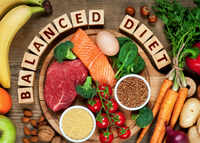Here's how clean eating can become an unhealthy obsession
Consuming healthy food is a good practice, till the time it turns into an obsession because then it becomes physically and socially impairing. According to a recent study, those who have a history of an eating disorder, obsessive-compulsive traits, dieting, poor body image, and a drive for thinness are more likely to develop a pathological obsession with healthy eating or consuming only healthy food, known as orthorexia nervosa (ON).In the first exhaustive review of psychosocial risk factors associated with orthorexia nervosa, York University psychology researchers examined all studies published up until the end of 2018 in two popular databases.They looked at studies that examined how orthorexia nervosa is related to psychosocial risk factors that predisposed or made an individual vulnerable to or more likely to develop the condition. They then amalgamated all available findings for each risk factor to reach conclusions about which psychosocial factors were most reliably associated with the condition. Over time, they spend increasing amounts of time and effort purchasing, planning, and preparing pure and healthy meals, which eventually becomes an all-consuming obsession that interferes with other areas of life and results in weight loss.Other eating habits such as being a vegetarian or vegan also put individuals at higher risk for developing orthorexia nervosa. Lacto-vegetarians were at highest risk for the condition and people who are on a strict eating schedule, spending large amounts of time preparing meals, were also at greater risk.Findings of the study were published in the Journal of Appetite.
- whatsapp
- Facebook
- twitter
- Email
- linkedin
- Embed
- messgae
MORE VIDEOS
 01:12Here's how clean eating can become an unhealthy obsession
01:12Here's how clean eating can become an unhealthy obsession 04:01PM Modi dares West Bengal CM Mamata Banerjee in UP rally
04:01PM Modi dares West Bengal CM Mamata Banerjee in UP rally 01:13‘ModiLies’ is new word that’s popular worldwide, tweets Rahul Gandhi
01:13‘ModiLies’ is new word that’s popular worldwide, tweets Rahul Gandhi 01:50Shocking! NCP workers release assault video
01:50Shocking! NCP workers release assault video 00:57Agencies take shape for special operations, space, cyber war
00:57Agencies take shape for special operations, space, cyber war 01:20Jammu and Kashmir: Encounter underway in Pulwama, 2 terrorists killed
01:20Jammu and Kashmir: Encounter underway in Pulwama, 2 terrorists killed 03:45EC acting on instructions of BJP: Mamata Banerjee
03:45EC acting on instructions of BJP: Mamata Banerjee 02:06Make a bad picture of me, won’t file FIR: PM Modi's dig at Mamata
02:06Make a bad picture of me, won’t file FIR: PM Modi's dig at Mamata 02:17WB will help BJP cross 300, says Modi; accuses Mamata of inciting violence
02:17WB will help BJP cross 300, says Modi; accuses Mamata of inciting violence 00:53Guwahati: At least 6 injured in a grenade blast
00:53Guwahati: At least 6 injured in a grenade blast 07:52Will Narendra Modi overcome farmer woes in Madhya Pradesh?
07:52Will Narendra Modi overcome farmer woes in Madhya Pradesh?
 01:12
01:12 04:01
04:01 01:13
01:13 01:50
01:50 00:57
00:57 01:20
01:20 03:45
03:45 02:06
02:06 02:17
02:17 00:53
00:53 07:52
07:52